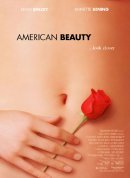Eye For Film >> Movies >> American Beauty (1999) Film Review
American Beauty
Reviewed by: Angus Wolfe Murray

In this brave new century, where sound bites substitute for intelligence and fast food provides succour for a snack'n'go generation, it is remarkable to find a film that provides so much meat with the fries.
Oscar contenders aren't made like this, so dark and dirty, so anarchic and ironic. It carves up the American way of life into little pieces. It takes the traditional apple pie and dumps it in the trash. It says to those who are still listening: "Life is one big phony farce."

Essentially, it is about faking it - marriage, sex, job, kids, neighbours, morality. "Never underestimate the power of denial," Wes Bentley says at one point. The only characters who see things as they really are and don't compromise for the sake of popularity are considered freaks.
As a thumbnail analysis of the middle-class American psyche, Alan Ball's script is a devastating attack. It is also extremely funny. You have both the humour and the horror as well as performances that etch themselves on your subconsciousness.
At 42, Lester Burnham (Spacey) wakes up. "My marriage is a commercial for how normal we are," he says, meaning it's dead, but don't tell anyone. Carolyn (Annette Bening), his wife, runs her own real estate company, which is losing out to the charm king (Peter Gallagher), her esteemed rival. Their daughter, Jane (Thora Birch), hates her parents. Conversation at meal times has the chill factor of an ice storm.
"Say what you have to say," she snaps. "And save me the propaganda." Lester tells his much younger, new boss what he thinks of him. He fantasises about Jane's best friend, Angela (Mena Suvari), a blonde nymphette in the high school basketball cheerleaders' squad. He buys hash from the son (Wes Bentley) of an ex-Marine colonel (Chris Cooper), who recently moved into the house next door, and starts a regime of workouts in the garage, because he knows Angela likes muscular bodies.
American Beauty is not as bleak as Happiness, although they share a fascination for the struggle between what is acceptable and what is desirable. Neither is it a midlife crisis comedy in the style of Steve Martin, with the obligatory let's-run-away-and-start-all-over happy ending.
Under British theatre director, Sam Mendes' imaginative eye, the movie astonishes with its breadth of scope, covering every aspect of dysfunction - from voyeurism to stalking to homophobic rage to role playing to unlawful killing.
"There's nothing worse in life than being ordinary," ordinary Angela says. It is not a question of perversity versus conservatism. It is the recognition that falsehood protects suburbia from implosion and films like this save Hollywood from atrophy.
Reviewed on: 19 Jan 2001
















